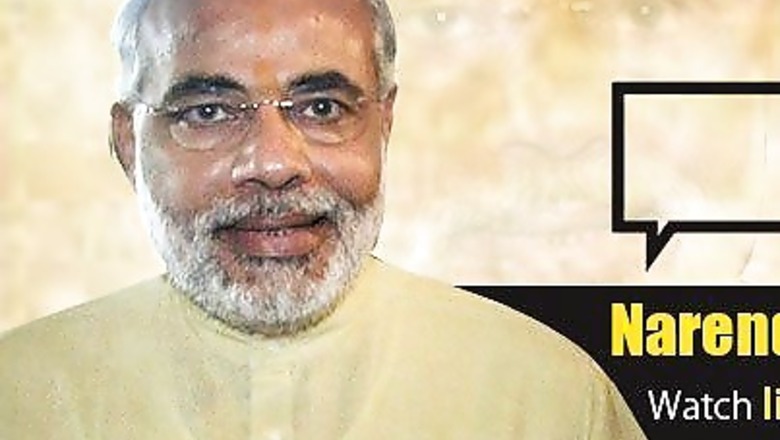
views
New Delhi: Gujarat Chief Minister Narendra Modi was the toast of the day as he took to the stage on Monday, first at an event hosted by the FICCI Ladies Organisation and later, at the Network 18's first Think India Dialogue in the capital. At the former, he wooed women entrepreneurs with talks on the need for their empowerment, education and safety, during the latter, Modi spelt out his definition of governance as opposed to the "omnipresent government".
"The government is omnipresent in India. Still governance is lacking, which results in the people losing their faith in the institution. God is omnipresent, and people have faith in him. Why? It is because god doesn't discriminate, but the government does," Modi said.
"Government means rules and regulations while governance means delivery. Government is all about power, governance is about empowerment. Government is all about files, governance is about life. Government is all about outlay, governance is all about outcome," Modi said, further clarifying his idea of governance.
Modi presented various examples from Gujarat to underline his main points. He explained how the Gujarat government had managed to decentralise power when it came to "ornamental activities". He gave the example of lift inspection and said that it had been outsourced to private companies, thus saving the government additional headache. The Gujarat strongman described how land acquistion took place in the state, where the farmer was not exploited, but favoured. Modi explained that the Gujarat government facilitated direct meetings between the farmers and the interested private parties, whereby the farmers would quote a price for their land. Modi added that utmost care was taken to ensure that the sensibilities of the farmers were not offended by an outward show of splendour and wealth by the visiting parties. "We tell the private parties to dress up properly and not arrive in big cars, just to put the farmers at ease while meeting them," Modi told the gathering.
During his speech, Modi enlisted ways and means of achieving good governance, which included involving the people in decision-making, innovating new technology, overhauling the educational system, channeling India's youth power and putting its democratic values to good use. "The public-private partnership is not sufficient anymore. The need of the hour is people-public-private partnership," Modi said.
The BJP leader, who is also its likely Prime Ministerial candidate for the 2014 elections, warned that too much of politics and power play leads to policy paralysis, which in turn leads to a slow decline in people's faith in the government, which in turn leads to social deterioration.
Modi, however, had a strong word for the the general public too. Citing the example of how the comman man was more concerned about, and hence took better care of, his old scooter than a brand new transport department bus, Modi said, "The people do not care about public property. Their 'mera kya?' and 'mujhe kya' (general indifference) attitude has ruined the country. Often the public fails to follow the laid-down rules, which further complicates the system." He was quick to add that this also reflected a lack of faith in the government by the people.
During his address to the FICCI Ladies Organisation, Modi called for the need to integrate and financially empower women to achieve growth and make India a developed country. Modi said that women constituted 50 per cent of the country's population and India could become a developed nation only if the women of the country were allowed to come forward and contribute to the economic betterment of the nation.
In keeping with his carefully cultivated image of a pro-industry and development oriented leader, the Gujarat Chief Minister highlighted the entrepreneurial spirit of the womenfolk from his state and pitched for the growing woman entrepreneur, saying that every woman has entrepreneur qualities and values and it was the society's responsibility to nurture that streak.
"Now, women are two steps ahead of men. We need to recognise the power of women. Boys want to marry women who are working, times are changing. It should not be only for financial interest, the mindset should also change," Modi said.
Citing the examples of women leading the business from the front in Gujarat, he said that brands like Amul, Lijjat and Jassuben pizza were all driven by women entrepreneur. "In Ahmedabad Jassu Behen's pizza is very popular, people prefer those pizzas over Pizza Hut pizzas. Jassu Behen died 5 years back but her pizzas still capture the markets of Gujarat. Lijjat papad was started by Gujarat's tribal women. It's a model of entrepreneurship," Modi said.
However, he also pointed that women were not given the respect that they deserve in the India of 21st century and female foeticide was rampant in the country, including Gujarat which he claimed was much more developed than a major part of India. "Our ideas have only deteriorated with education, we are becoming more medieval than we were in the 18th century. In the 21st century, girls are aborted inside the mother's womb. Both men and women have a role to play in this crime. This happens in Gujarat too. The data on female infanticide is shocking," Modi said. He categorically said that men should not underestimate women at all.
Striking a chord with the women business leaders, Modi used his oratory skills to paint a grim picture of the country under the Congress for the slow economic growth of the country and also blamed the Gujarat Governor for stalling empowerment of women by claiming that a bill providing for 50 per cent reservation for women had been blocked by her.

















Comments
0 comment